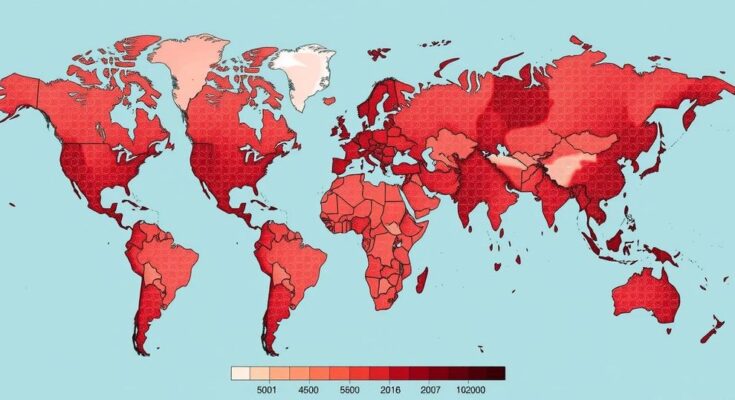Democracy has declined for eight consecutive years globally, with credible elections and oversight at their lowest level in decades. Factors such as intimidation, interference, and disinformation have contributed to this trend. Voter turnout has fallen significantly, and nearly one in three elections are contested. The situation calls for urgent action to restore democratic integrity and participation.
Democracy has experienced a significant decline globally for the eighth consecutive year, according to the International Institute for Democracy and Electoral Assistance (IDEA). The report highlights that credible elections and parliamentary oversight have deteriorated to their worst levels in nearly fifty years, driven by factors such as government intimidation, foreign interference, disinformation, and the misuse of artificial intelligence during campaigns. The organization reported a decrease in voter turnout, from 65.2% in 2008 to 55.5% in 2023, indicating a troubling trend in democratic participation. Disturbingly, nearly one in three elections are contested in some capacity.
Kevin Casas-Zamora, Secretary-General of IDEA, emphasized, “Elections remain the single best opportunity to end democratic backsliding and turn the tide in democracy’s favor. The success of democracy depends on many things, but it becomes utterly impossible if elections fail.” His remarks underline the critical role of elections in maintaining democratic integrity.
IDEA’s Global Report assesses democratic performance in 158 countries from 1975 to the present, revealing that 47% of nations have noted declines in essential democratic indicators over the past five years. The period from 2020 to 2024 has seen approximately 20% of elections challenged by candidates or parties rejecting the results, with equal occurrences of court appeals.
The report further designates 2023 as a particularly challenging year for free and fair elections, attributing numerous concerns to foreign interference, misinformation, and the exploitative potential of artificial intelligence. It notes that declines in democratic standards are evident across both established democracies and fragile nations worldwide.
In Africa, despite some stability, the Sahel region, notably Burkina Faso, has seen notable declines due to military coups. Conversely, countries like Burundi and Zambia have exhibited improvements. Western Asia has fared poorly in democratic performance, while Europe has experienced declines in civil liberties and rule of law, though progress has been noted in Montenegro and Latvia. The Americas display overall stability, yet Guatemala, Peru, and Uruguay have shown lapses in governance, particularly concerning legal frameworks and civil rights.
The Asia-Pacific region presents mixed outcomes, with minor declines or stability observed in most nations. However, significant setbacks were noted in Afghanistan and Myanmar, where the political landscape remains tumultuous following the Taliban’s rise to power and ongoing civil conflict, respectively.
The issue of declining democracy globally stems from various political and social challenges that nations face today. Over the years, there has been an increase in government oppression, manipulation of electoral processes, and external influences that undermine public trust in democratic institutions. The International Institute for Democracy and Electoral Assistance (IDEA) has highlighted these systemic issues in its reports, providing valuable insights into the trends affecting democratic governance. With elections being a primary mechanism for citizens to express their political will, their integrity is crucial for the health of democracy worldwide. The increasing rates of electoral disputes and declining voter turnout suggest a concerning trajectory that requires urgent attention.
The eighth consecutive year of democratic decline, as outlined by the International Institute for Democracy and Electoral Assistance, emphasizes the urgent need to address the systemic challenges facing elections worldwide. Factors such as government intimidation, foreign interference, and misinformation continue to erode the foundations of democratic governance. Moreover, the significant drop in voter turnout reflects a disengagement that risks further destabilizing democracies around the globe. It is imperative for nations to prioritize the integrity of electoral processes to restore public trust and uphold democratic principles.
Original Source: apnews.com




